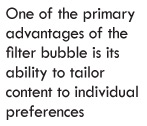In the age of information overload and digital interconnectedness, the concept of the “filter bubble” has become increasingly relevant.
 Coined by internet activist Eli Pariser in 2011, the filter bubble refers to the personalized online ecosystem created by algorithms that selectively present content to users based on their past behaviour, preferences, and demographics.
Coined by internet activist Eli Pariser in 2011, the filter bubble refers to the personalized online ecosystem created by algorithms that selectively present content to users based on their past behaviour, preferences, and demographics.
While this phenomenon offers certain advantages, it also raises concerns about the potential consequences of narrowing one’s exposure to diverse perspectives.
Advantages
Personalized Content Curation: One of the primary advantages of the filter bubble is its ability to tailor content to individual preferences. By analyzing users’ browsing history, search queries, and social media interactions, algorithms can deliver relevant information, news, and entertainment, enhancing the overall user experience.
Time efficiency: In a digital landscape saturated with information, the filter bubble helps users efficiently navigate vast amounts of content by prioritizing items that align with their interests. This saves time and reduces cognitive overload, allowing individuals to focus on what matters most to them.
Enhanced user engagement: By presenting users with content that resonates with their interests and beliefs, the filter bubble can increase engagement and encourage continued interaction with online platforms.
This fosters a sense of connection and loyalty among users, benefiting both individuals and content creators alike.
Targeted advertising: From a business perspective, the filter bubble enables more effective targeting of advertisements based on users’ preferences and behaviour. By reaching relevant audiences, advertisers can improve the return on investment (ROI) of their marketing campaigns and enhance the overall effectiveness of digital advertising strategies.
Disadvantages
Echo chambers: Perhaps the most significant drawback of the filter bubble is its potential to create echo chambers, wherein individuals are exposed only to information and opinions that reinforce their existing beliefs and viewpoints.
This can lead to polarization, ideological extremism, and a lack of exposure to alternative perspectives, hindering critical thinking and fostering division within society.
 Limited diversity of information: By prioritizing content that aligns with users’ preferences, the filter bubble may inadvertently restrict access to diverse viewpoints, opinions, and sources of information. This can result in a narrow understanding of complex issues and a lack of exposure to dissenting or challenging perspectives, undermining the principles of democracy and free speech.
Limited diversity of information: By prioritizing content that aligns with users’ preferences, the filter bubble may inadvertently restrict access to diverse viewpoints, opinions, and sources of information. This can result in a narrow understanding of complex issues and a lack of exposure to dissenting or challenging perspectives, undermining the principles of democracy and free speech.
Algorithmic bias: The algorithms that power the filter bubble are not immune to biases inherent in their design and data inputs. This can lead to unintentional discrimination, exclusion, and amplification of stereotypes, particularly concerning race, gender, ethnicity, and socio-economic status, perpetuating systemic inequalities and injustice in society.
Threat to democratic discourse: In a democracy, informed citizenry relies on access to diverse sources of information and the ability to engage in open dialogue and debate.
The filter bubble’s tendency to isolate individuals within ideological bubbles can impede constructive discourse, compromise the quality of public debate, and undermine the democratic process itself.
While the filter bubble offers certain advantages in terms of personalized content curation, time efficiency, user engagement, and targeted advertising, its disadvantages, including echo chambers, limited diversity of information, algorithmic bias, and threats to democratic discourse, underscore the need for greater awareness, transparency, and accountability in the design and implementation of algorithmic systems.
As users and creators of digital content, it is essential to critically evaluate the implications of the filter bubble and strive for a more inclusive, diverse, and informed online ecosystem.






